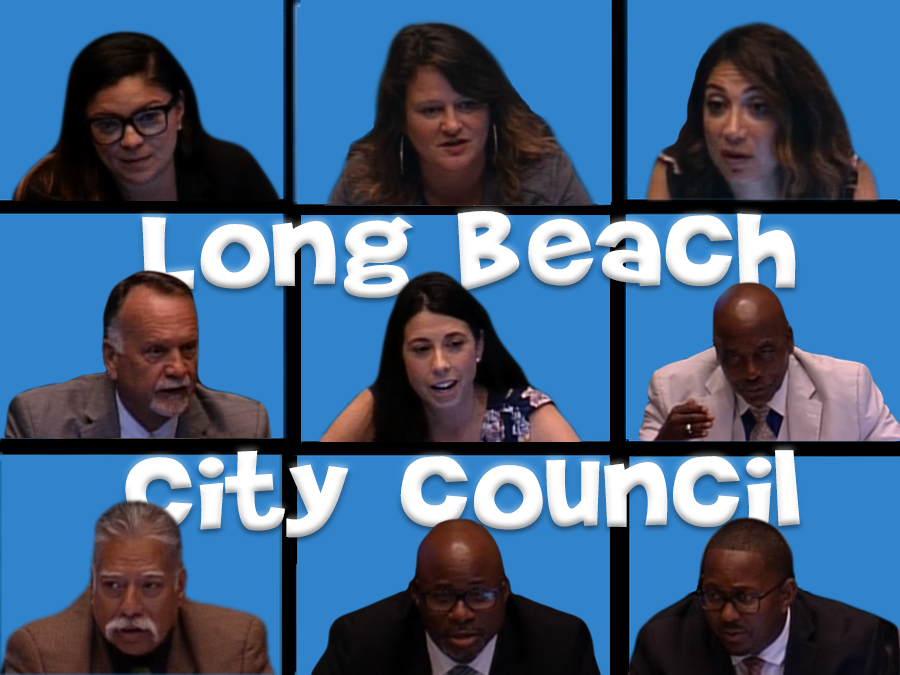Last Night @ City Council: Weed, Women Power, and one Councilmember’s Weird Words
7 minute readCouncil Green Lights Adult-Use Marijuana
With about 45 people in the audience, Long Beach, which has a long and storied history of both prohibition and being a stoner melting pot, officially, after years of negotiations, legalized recreational cannabis sales.
But not so fast says the mayor…
Not until I sign the law 😎 – Probably Friday 👍🏼
— Robert Garcia (@RobertGarciaLB) July 11, 2018
Sans a mayoral veto, the council’s approval of a final reading of the adult-use cannabis ordinance Tuesday makes it all but official. The ordinance allows 32 cannabis retail shops within the city, as well as allowing for the cultivation and manufacturing of cannabis. Up until this point, cannabis was only allowed to be purchased with a letter from a physician which recommends the use of medicinal marijuana. Now, anyone 21 years or older will be able to purchase marijuana, possibly as soon as August.
For a closer look at the adult-use ordinance, read our previous piece on the subject.
Some revisions were made to the ordinance but they were not significant enough to call for another first reading.
Councilmember Stacy Mungo (CD-5), who voted against the first reading, was able to secure some changes she wanted to see made to the ordinance. These changes reduce restrictions for the social equity hire component—a program aimed at guaranteeing employment in the cannabis industry for those negatively impacted by the war on drugs. Her changes included adding city residents currently receiving unemployment to the list of people who qualify as a social equity hire. The ordinance requires 40 percent of all cannabis employee work hours to be performed by a social equity hire.
Representatives from the city’s cannabis industry were in attendance as Long Beach became the 145th city in the state to allow recreational marijuana. After the vote, largely expected after the first reading passed last month, one jokingly commented “that was easy,” but the truth of course is that last night concludes a decades-long battle to bring legal cannabis to the city.
Adam Hijazi is co-owner of the Long Beach Green Room and a founding member of the Long Beach Collective Association, a trade association that represents cannabis business owners. They formed in 2011 after the city instituted a ban on medical cannabis that led to raids on pot shops by the Long Beach Police Department.
“We’re thrilled. It’s been a long time coming and we’re glad we’re still here talking about it and being part of the process,” Hijazi said.
The association drafted the medical marijuana ordinance that the adult-use ordinance builds upon.
Matt Bell, Executive Vice President of The United Food and Commercial Workers Local 324, was also in attendance.
Along with representing employees in the grocery, retail, and distillery industries, the union also represents workers at nine medical marijuana shops in Long Beach. The UFCW was instrumental in the inclusion of a labor peace agreement in both the adult-use and medical cannabis ordinances, which guarantees that employers do no impede employees from unionizing.
“[We wanted] to make sure that as this industry grows workers are represented and that the workers have a voice,” Bell said.
And while the ordinance will surely need to be fine tuned as this burgeoning industry expands, much of the legislative labor is finally over.
When it was mentioned to Hijazi that the multi-year struggle with city hall must have been quite the civic education, he quipped: “Way more than I signed up for.”
Historic Night for Long Beach Women met with Bizarre Comments From One Councilmember
For the first time in Long Beach’s history, women will hold a majority of positions on the city’s 26 commissions, with 52 percent of the seats.
The scale was tipped with the appointments of Geetanjali Reuben and Mary Sophiea to the Airport Advisory Commission; Flora Easter to the Senior Citizen Advisory Commission; Jenny Novak and Hilda Gaytan to the Sustainable City Commission; and Lindsay Mais to The Long Beach Community Investment Company.
The appointments were made before a council chamber audience that included dozens of women commissioners who had been invited for a pre-meeting photo-op with the mayor to commemorate the occasion. Twenty-three other commissioners, both men and women, were also reappointed.
While the mayor and councilmembers chimed in with their own congratulatory thoughts during the meeting, Councilmember Dee Andrews (CD-6) utilized the historic occasion to say:
Tomisin Oluwole
Dine with Me, 2022
Acrylic on canvas
36 x 24 inches
Click here to check out our interview with Tomisin Oluwole, a literary and visual artist based in Long Beach.

Instead of gunking up our site with ads, we use this space to display and promote the work of local artists.
“First of all, thank you for stepping up and serving, and for the commitment you guys have brought … But I think the biggest part of all of this [is] I just wish the Mayor had a little more vision for us to [have] this every night. Look out in the audience, young men, this makes it so beautiful, like, I could love to come to a council meeting like this. Thank you.”
Watch for yourself here.
Later, there was some brief confusion about whether a recent appointee’s name had been mistakenly skipped during the evening’s commemoration. When it was confirmed that she had already been appointed at a previous meeting but not formally recognized, Mayor Robert Garcia, laughing with the crowd at the harmless hiccup, asked everyone to recognize her anyways for a second time: “Stand up. Let’s give her a round of applause.”
At this moment, Andrews interrupted, and referring to the appointee, said, “…excuse me, Mayor, also, that was my student, Wilson high school, thank you, my health class, yes. You can see why you were appointed.”
Both of Andrews’ questionable and unfitting remarks distracted from the occasion, but nonetheless the city’s effort to reach parity on the commissions is commendable; and perhaps one day we can hope to see a similar majority-representation for women on the council.
Item To Draft Rules Making City Manager Advisory Bodies’ Head Elbowed Off Agenda
A request to draft-up an ordinance that would give the city manager and his staff the power to determine what can and cannot be agendized for the meetings of various advisory bodies was yanked from the council’s agenda at the beginning of the meeting, with no indication of when it might resurface.
The item was removed at the request of commissioners—many of whom were in the audience as previously mentioned, yet had not been officially notified of this heralding shift in the civic power structure.
Currently, the boards, committees, and commissions the proposed rules would affect more or less independently determine what will be up for discussion during their meetings. The ordinance would not have applied to charter commissions.
While both the advisory bodies and the city manager serve at the pleasure of the mayor and council, such an ordinance would concentrate control of policy discussions among the advisory bodies within the city manager’s office.
While these advisory bodies do not set policy themselves, they advise lawmakers on policy-related matters and are a gateway for the public to have their concerns elevated.
The staff report for the item states that the impetus for this restructuring is existing confusion “about the bodies’ roles and responsibilities, including best practices for how bodies should operate, transmit ideas to the city council, and set agendas” which have “prevented the bodies from operating in an effective and efficient manner.”
However, the report did not provide specific examples of this confusion, and various commissioners we spoke to did not feel there was a need to have the city manager control their agendas.
The Circular Files
The LBPD was authorized to destroy case files from the Domestic Violence Unit, dating back less than ten years, to 2009. Case files typically contain crime, evidence, and arrest reports, as well as other supporting documents.
Typically, due to the statute of limitations, state law requires law enforcement agencies to retain misdemeanor case files for six years and felony case files for 10 years.
The nature of the LBPD case files to be shredded was not made public.
A consent item that was approved by Council earlier in the meeting orders the destruction of case files from the LBPD Domestic Violence Unit from 2009. pic.twitter.com/BicFXfHHDh
— LBC Meeting Notes (@LBCMtgNotes) July 11, 2018
Follow @LBCMtgNotes on Twitter for live updates during every City Council meeting.
Please support local grassroots media by subscribing to FORTHE.


 editors@forthe.org
editors@forthe.org




